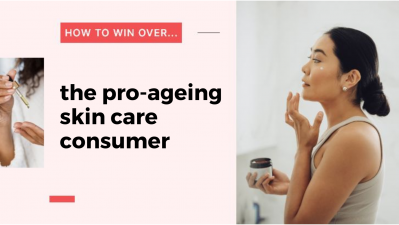Helping hand: COVID-era start-ups navigating the next stage of growth get help from P&G
![Mira and Oupus Organics tackle the next level of business advancement with support from P&G. [Getty Images]](https://www.cosmeticsdesign-europe.com/var/wrbm_gb_food_pharma/storage/images/_aliases/wrbm_large/publications/cosmetics/cosmeticsdesign-asia.com/headlines/brand-innovation/p-g-helps-covid-era-start-ups-navigating-the-next-stage-of-growth/16501940-1-eng-GB/P-G-helps-COVID-era-start-ups-navigating-the-next-stage-of-growth.jpg)
The COVID-19 pandemic has led to a surge in the number of new businesses. In the US alone, 5.4 million new business applications were filed in 2021, surpassing the record set in 2020 of 4.4 million, according to the Census Bureau.
Mira and Oupus Organics were part of that small business boom. Both start-ups were established in 2020 – right in the thick of the COVID-19 pandemic.
The former is a Singapore-based company that handcrafts eco-friendly soaps and wellness gift sets, while the latter is a Malaysia-based firm that has developed a range of products with Bambangan, a Borneo rainforest superfood.
While circumstances were in a constant state of flux during COVID-19, both female-led businesses have made strides in propelling business development.
Founder of Oupus Organics, Vellarry Yong, who started out handcrafting skin care as a hobby, is now a social enterprise that promotes breast health and breast cancer awareness.
“I started as a home-based business initially selling online. We also recruited women to become our agents to help them to generate income and sustain their lives during that hard time when many people were affected financially because of retrenchments and so forth. Now have our own physical store.”
Mira’s business had also undergone changes over the last three years, shifting gears towards a business-to-business (B2B) model.
“The business started out to offer people sustainable [personal care] choices and then we realised people are more conscious about gifting. Our soaps, as it turns out were great for sustainable gifting. Now, we’re predominantly a more of a gifting supplier,” said Nupur Khemka, founder of Mira.
Like all businesses, Oupus Organics and Mira were facing the hurdles of expanding their operations and taking things to the next level.
“It changes as you grow to another stage in the business. When I started, the issue was about hiring talent. Now, it’s about keeping them motivated so I can retain them. Turnover can be a real issue, especially for us because we work a lot with part-timers,” said Khemka.
More often than not, the solutions to the problems they face are not straightforward
“Today, the challenge I face is expanding and that requires a lot of leadership skills. I started with zero knowledge in business so because I want to expand, I need to equip myself with necessary leadership skills,” said Yong.
In addition to that, the companies are also tackling escalating expenditures attributed to inflationary factors.
Connect and grow
Khemka and Yong recently participated P&G Women Entrepreneurs Academy (WEA), which concluded in March.
The programme involved 23 women entrepreneurs – 10 from Singapore and 13 from Malaysia – who underwent a series of training and development modules which aimed to empower them with the right skills and tools to grow their businesses.
“I learnt from experts and industry players, but also from my peers. Having discussions with them helped me to evolve my critical thinking and my leadership skills. Seeing other women in leadership roles gave me the confidence that I can lead my team too. That was the biggest takeaway I had from the programme,” said Yong.
Khemka added: “We covered a broad range of topics during the training. From branding, procurement, sales, operations, and we even covered the soft skills of leadership which is so important right now. They had pointers on retaining staff and covered Ai and new tools like ChatGPT. It was very insightful.”
Yong expressed that collaborations with multinationals were crucial in helping small and medium-sized enterprises (SMEs) accelerate their growth and development.
“I hope more big companies like P&G can work with us smaller SMEs, which have limited resources – not just financial but in terms of network as well. Their help can take us higher so we can be competitive in this industry,” she said.
P&G has pledged its commitment to spending a cumulative total of USD300m working with women-owned and women-led businesses across the Asia Pacific, the Middle East, and Africa region from 2021 to 2025.
According to the firm, it has already invested USD175m in this initiative.
"We have a role and desire to remove barriers to economic opportunities for women through sustainable measures and advocacy efforts… Women-owned businesses are not just good for the economy, but also for shaping a community. This is because when more women take the lead, they become role models to many others to take the same path,” said Priyali Kamath, senior vice president, skin and personal care and executive sponsor, equality & inclusion, P&G Asia Pacific, Middle East & Africa.

![LG H&H outlines plans to drive growth. [Su:m 37]](https://www.cosmeticsdesign-europe.com/var/wrbm_gb_food_pharma/storage/images/_aliases/wrbm_medium/publications/cosmetics/cosmeticsdesign-asia.com/headlines/business-financial/lg-h-h-aims-to-reinforce-luxury-beauty-unit-to-drive-future-growth/16395443-1-eng-GB/LG-H-H-aims-to-reinforce-luxury-beauty-unit-to-drive-future-growth.jpg)


![Chinese study highlights mental health challenges in atopic dermatitis, emphasising holistic patient care. [Getty Images]](https://www.cosmeticsdesign-europe.com/var/wrbm_gb_food_pharma/storage/images/_aliases/wrbm_tiny/publications/cosmetics/cosmeticsdesign-asia.com/headlines/formulation-science/chinese-research-linking-atopic-dermatitis-to-mental-health-underscores-need-for-holistic-care/17040623-1-eng-GB/Chinese-research-linking-atopic-dermatitis-to-mental-health-underscores-need-for-holistic-care.jpg)





